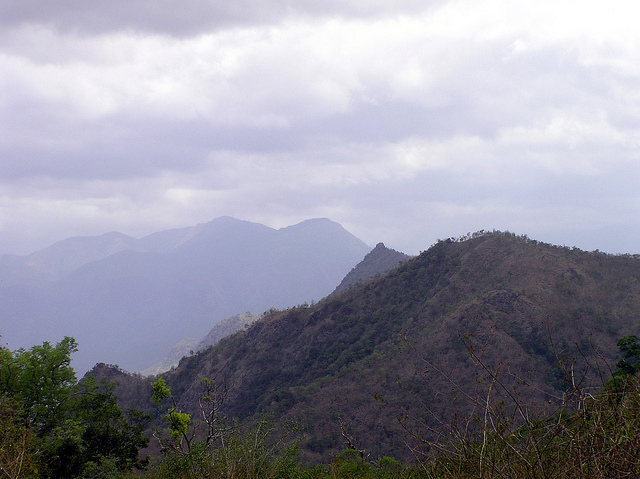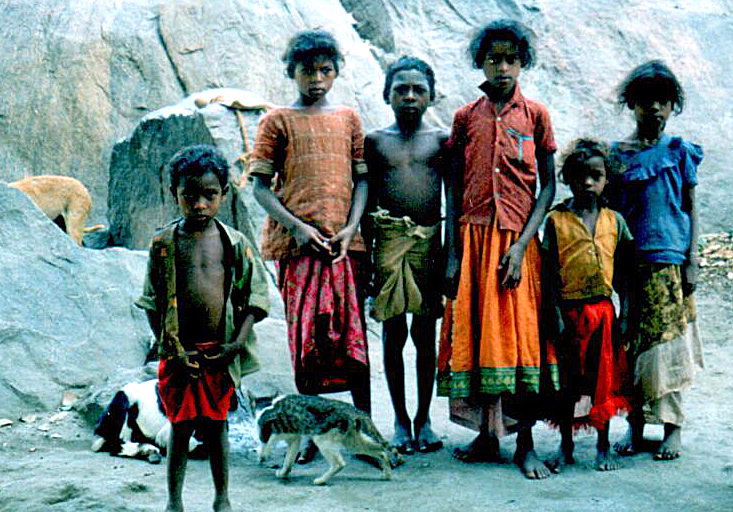A band of Paliyans used to live in the Sathuragiri Hills in the Western Ghats, but they settled into Ram Nagar in 1993 and they have had difficulty getting by ever since. A feature in The Hindu early last week described their former lives and the problems they now have to deal with.

The newspaper indicated that they used to live in caves in the hills, where they collected tubers, fruits, and honey and were intimately familiar with the surrounding wild lands. K. Ramar, a 60-year old Paliyan, told the reporter, “Earlier, we lived on the rice … and other grocery items we bartered for honey and other herbal plants.” They sold the forest products they had collected in the communities of Sundararajpuram, Watrap, and Akashampatti.
But they soon realized that conditions were changing. They no longer had the easy access they used to have to forest products they had traditionally gathered. “Often, the forest officials would not allow us to enter the jungle on one pretext or the other,” said A. Periyakaruppan, a 44-year old. The district government intervened, however, and the Paliyans were allowed to gather 13 different items, including honey, nanari, and amla.
The industrial firm Ramco became involved in the welfare of the Paliyan settlement and, cooperating with the government, it built houses that were electrified and that had decent road access. The company also helped the people obtain community certificates and ration cards. The tribal people were assisted in obtained their Aadhaar cards, which have unique identification numbers that will help them gain access to the financial structure of India.

But not all has worked well for them. Two groups of women received training in the cultivation of mushrooms and in fabricating dhoops, types of sticks used for incense in India. But the women lacked the financing necessary for building the sheds that would allow them to grow the proposed mushrooms and for acquiring the machinery needed to make the herbal incense sticks.
A supplementary story in The Hindu, posted the same day, indicated that some men from the Paliyan community had applied to work at a local temple, the Sri Sundaramahalingam Temple, but they had not been hired. Mr. Periyakaruppan complained that, despite having been trained for forestry work, their young men are not being hired. “We have at least eight youngsters who are eligible for the post of forest watchers, with class X. Though there is vacancy in Virudhunagar district for the post, our youths are not considered,” he said. He added, “Our men are trained to climb up and down the hard rocky terrain with much ease. But, we are not given jobs,”
On Tuesday last week, the Times of India jumped into the discussion by describing the educational programs that are being developed at a Paliyan settlement in the Tirunelveli and Theni districts of Tamil Nadu. They were initiated by the NGO PACR Sethuramamal Charity Trust, aided by several government agencies.

The charity met with the Paliyan people in several locations and helped them obtain basic services through enrolling in government insurance schemes, old age pensions, ration cards, certificates, ID documents, and the like. More recently, the NGO met with the people to help them complete applications for their Aadhaar cards.
One of the most significant activities of the Trust was the establishment of a hostel/school for Paliyan young people. The facility opened with 69 students in 2004 and it has grown to an enrollment of 155. The coordinator of tribal welfare, a man named Murgesan, said that while progress was slow at first, the school is doing well today. “Now, they are on a par with any town or city student competing not just in studies, but in extracurricular activities like yoga, spoken English, drawing and sports,” he said.

The official explained to the paper that the Paliyan parents at first resisted sending their children to the school. But the school persisted in advancing the importance and the future benefits to the Paliyans for their children getting an education, and the Paliyan community has slowly come around.
The efforts to encourage schooling are paying off. Some 33 students have completed class 10 in the past 10 years. Murgesan named a couple students who are doing very well: one of several he named is pursuing a BE in computer science. He added that the school also offers “skill training on how to make herbal medicinal products, cattle feeding and mushroom cultivation.”
The reporter quoted a 25-year old nurse from the Paliyan community, named S. Mahalakshmi. This individual got a BSc in nursing in 2015 and works in a hospital in Rajapalayam, Virudhunagar district. “We were separated from the society for too many generations and only now started concentrating in education, culture, family relationship, dress code and others,” Mahalakshmi said. “Now, I advise my relatives and neighbours to avoid child marriage.”